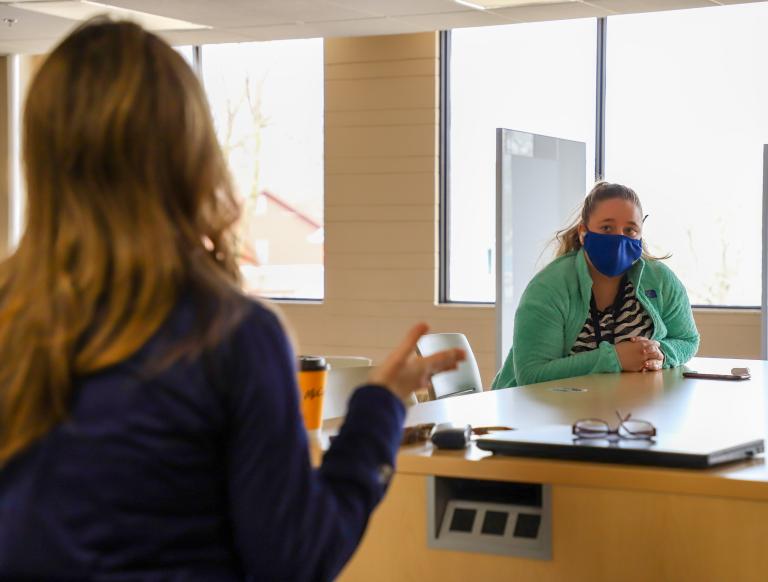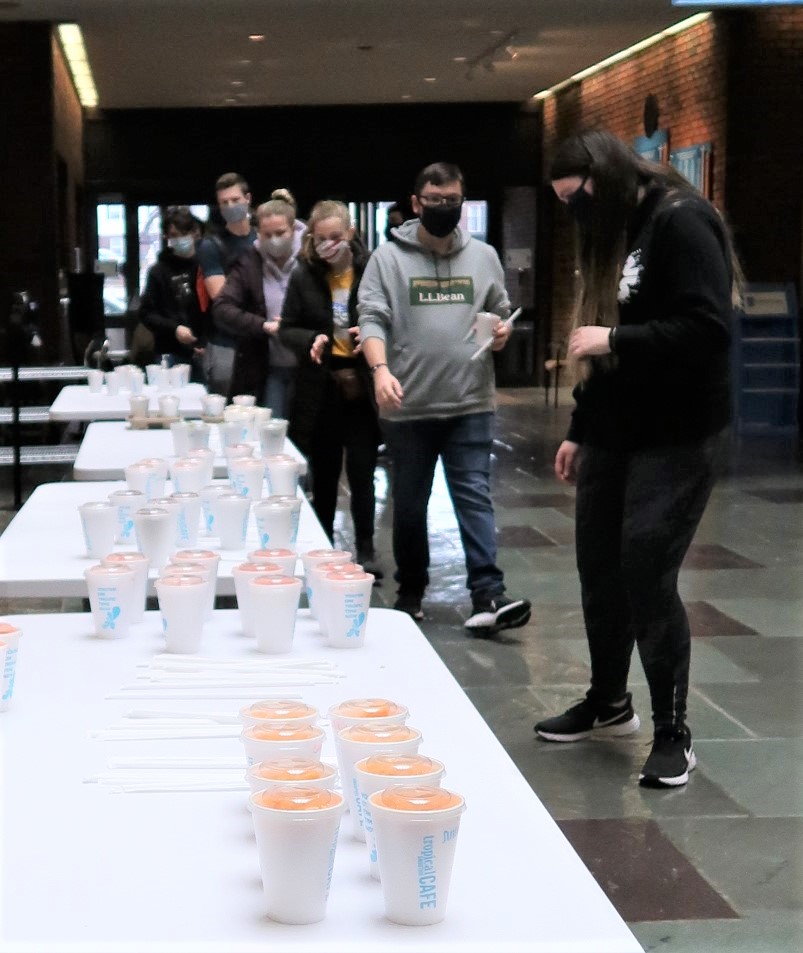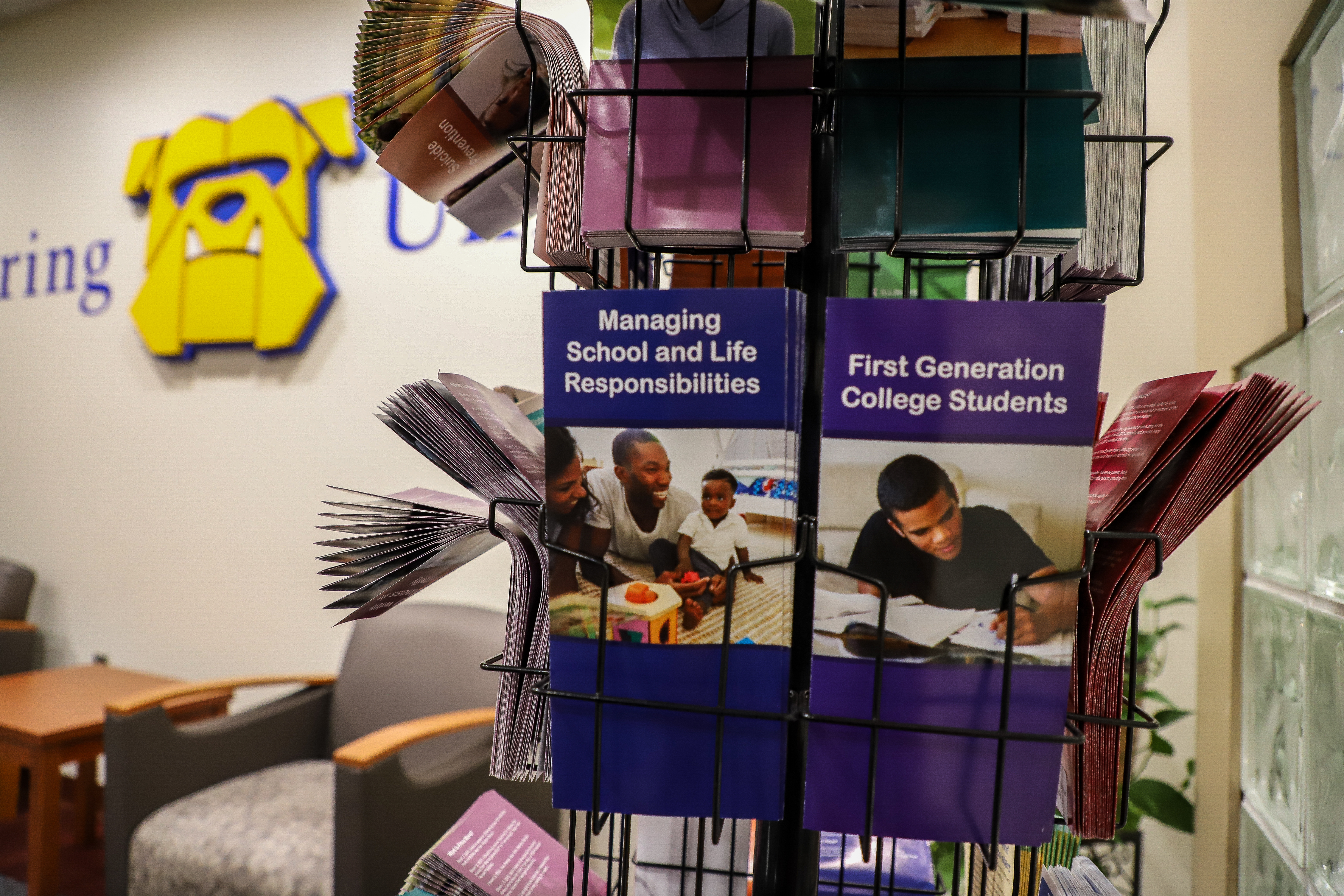
“We have all experienced a range of emotions throughout this time (and will continue in the future), but we continue to survive and start another day. ”
Whether it’s flexible tutoring, counseling sessions or even a safe movie night on campus, Kettering University has put a priority on student mental, physical and academic health during the COVID-19 pandemic.
Because the University has been back to in-person classes since July 2020, it has been able to implement safety protocols while at the same time finding innovative ways to ensure students not only have the on-campus experience socially, but succeed academically and address personal struggles during the past year.
Fostering New Academic Support and Services
As the Director of the Academic Success Center (ASC), Samantha Klaskow knew they would need to create more virtual and remote opportunities for students, but the pandemic gave them “a push off the diving board.”
“We didn’t sink; we swam,” said Klaskow. “We did it really well. I think we were able to do it so well because we’re small and we can connect with our students in ways that larger universities sometimes cannot.”
The need for tutoring and academic assistance has been comparable to pre-COVID-19 years, but students have told her they are “mentally drained,” she said.
“I just think that students struggle with the autonomy of online learning,” Klaskow said. “Our students are brilliant, we know that. The discipline that goes into maintaining that high-level of achievement with an online course, it’s still really easy for students to tune stuff out.”
The ASC staff and tutors who traditionally would be providing in-person advising, coaching, thesis support, test proctoring and more, were trained in how to deliver the same services in a virtual setting. The transition even served as a springboard for new services such as an alternative thesis option was created for students who couldn’t complete their initial thesis because of the pandemic.
“It was a great opportunity to see how we can marry those academic and professional experiences and have them reflect on it and be prepared to speak on it,” said Klaskow.
The office began using Tutor Me, an online platform students can use to supplement their courses that the University currently doesn’t have tutors in. Every student has five hours a week but can get more if needed. Tutoring is available 24 hours a day, seven days a week through video, voice or chat, and all sessions are recorded so students can refer back to them as needed. All tutors on the app are certified through the College Reading and Learning Association.
Another new feature the ASC started during the pandemic is a virtual lobby that staffed from 8 a.m. to 5 p.m., Monday through Friday.
Keeping Health and Wellness in Check
Overseeing the physical health, testing and contact tracing of students would be a full-time job for the University’s Wellness Center on its own, but COVID-19 has exposed a bigger priority — the mental health and well-being of students.
“I believe that some students were okay with overlooking their needs and brushing them off before the pandemic,” said Cristina Reed, Wellness Center Director. “As the pandemic has worn on, I think everyone realizes more that they need to acknowledge and be more vocal about their needs.”
Prior to the pandemic, Reed said they were addressing only on-campus students, but now their communications go to all students.
As a counselor in the Wellness Center, Erica Murto joined Kettering in July 2020. Her appointment schedule requesting virtual and in-person counseling sessions provided by the Wellness Center averages 10 to 14 appointments a week.
“I try to keep one appointment per student a week, but if there are extenuating circumstances, we can add more,” Murto said. “Or, they can come in and do a quick check-in.”
Students can make appointments, or they can drop in on a virtual forum on Wednesdays. The Be Well Space is open during Common Hour every Wednesday via Zoom.
Murto said one of the staff’s priorities has been getting the students to engage, even if it’s something small such as the mock election the Wellness Center ran in November 2020 between pizza and donuts.
The Wellness Center also recently started an Instagram account where it posts mental health resources and motivational infographics. In addition, students also receive regular emails with resource information and encouraging messages.
“I think as a department, we’ve done the best we can to keep it real with [students],” Reed said. “The genuineness is what they get from us, and I think they appreciate it.”
In the future, Murto said she wants to plan a virtual spirit day or week or coordinate some outdoor activities.
“People can still engage in those things and be safe and responsible and social distance,” she said. “And, that provides an outlet for people to get excited.”
Evolving the Campus Experience
From virtual bingo and trivia to movie nights and hayrides, students have that valuable on-campus experience at Kettering University as programming and events have continued throughout the pandemic — though now socially distanced and with all wearing masks.
“We have been offering things, but on a different scale,” said Myra Lumpkin, Director of Student Life Programs.
The types of events that are offered depend on COVID-19 restrictions in place at the time and weather, as the office was able to provide more activities during the warmer months because it was easier to socially distance outside.
Welcome Week featured a movie night, coffee and donuts in BJ’s Lounge, and Tropical Smoothie in the Great Court. Recently, students were able to attend a Bulldog Movie Night viewing “Wonder Woman 1984.”
“I think [students] are understanding even though we can’t do things the same way, it’s nice to do something,” Lumpkin said.
The Student Affairs office has also encouraged clubs and organizations to continue to meet in safe capacities. In some cases, students rotate who will attend meetings in person and who will attend virtually, she said.
“Our students are resilient, so they get creative to make sure their clubs are surviving and they are engaging with new students,” Lumpkin said.
Students have also been participating in events based on their comfort levels, Lumpkin said. Some prefer smaller events, while others will attend bigger events, but only participate in a specific activity of interest and leave.
“They are getting in and getting out,” Lumpkin said.
She said having more in-person events is helping the students, as they need and want the interaction.
“They are excited to see their friends and be back on campus,” Lumpkin said. “They were genuinely excited to have those different connections. A lot of them were working from home when they were on Co-op.”
The most important thing has been finding a way for students to get human interactions outside of class, she said. Students who need help getting that can contact them for help.
“If a student is having trouble finding things to do or getting involved, or if they feel like there’s not enough to do, reach out to us,” Lumpkin said. “Come by or email us. There are programs, activities and clubs and things for them to do.”
Moving Forward
Overwhelming and most importantly, the message all members of these departments stress was the importance of asking for help.
“Don’t ever be afraid to ask us,” Klaskow said. “We’ll figure something out for you as much as we possibly can. If you don’t know where to, come to the ASC. We’ll point you in the right direction.”
Being creative has also been key. Not just for students but for staff.
Like Klaskow, Lumpkin said the COVID-19 restrictions made their office think outside of the box to offer programs and activities.
“Having the COVID restrictions has opened a lot of folks’ minds about how they deliver resources and programming, so it got us to be innovative, and some of that innovation works, so we’ll keep some things,” she said.
While these departments provide valuable tangible services to students, they also pride themselves in being the voice of the students.
“What I tell people is that the take-away from this total experience is unique to each person,” Reed said. “We have all experienced a range of emotions throughout this time (and will continue in the future), but we continue to survive and start another day.
“We look anxiously for the next day to begin, but I hope that everyone can appreciate and live fully the day they have,” she continued. “We will get through all of this. We have the ability to control how we look at life and choose what we concentrate our efforts on. I hope that people see the silver linings and grasp onto them. New normals have been in the works for a while now, learning to embrace them is what is difficult. But we can do hard things.”

